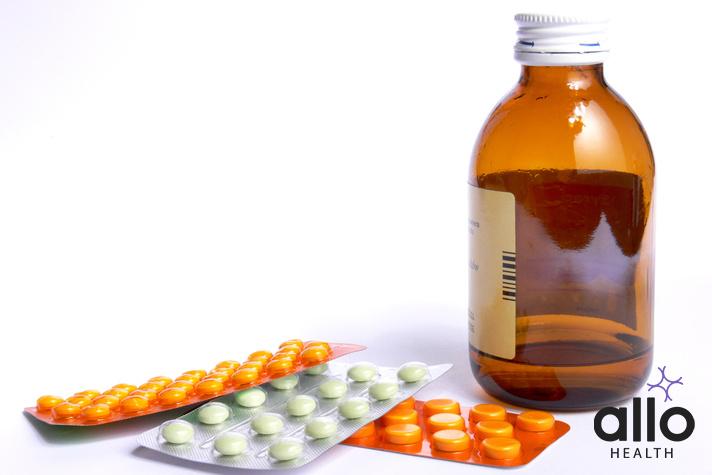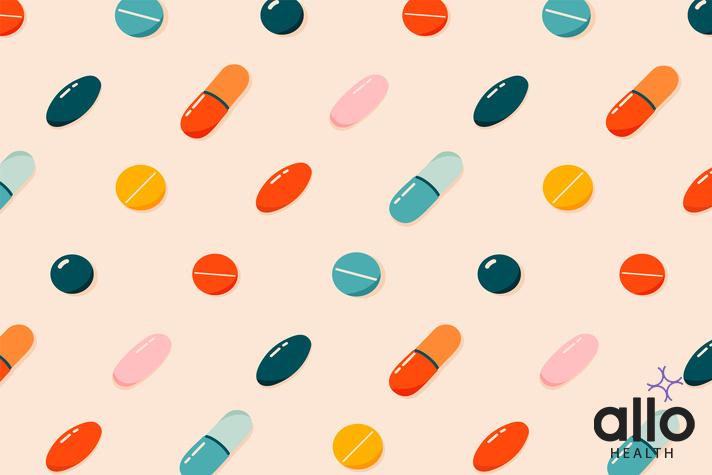Sildenafil 25 mg Tablet Uses

Allo Health is dedicated to personalized well-being, offering support and trusted information tailored to individual health goals. The platform emphasizes human-generated content, led by a distinguished medical team of experts, including physicians and sexual health specialists. Their commitment to credibility involves rigorous fact-checking, authoritative research, and continuous updates to ensure accurate, up-to-date information. Allo Health's unique approach goes beyond conventional platforms, providing expert-led insights and a continuous commitment to excellence, with user feedback playing a crucial role in shaping the platform's authoritative voice.

Dr Sanina Mansoor holds MBBS degree from Yenepoya university,Mangalore.She has 8 years of experience working as a medical officer at various health centres and medical colleges.
Why This Was Upated?
Our experts continually monitor the health and wellness space, and we update our articles when new information became available.
Updated on 18 January, 2024
- Article was updated as part of our commitment to diversity, equity, and inclusion.

"The following blog article provides information about a drug or brand name drug and its potential effects or benefits. However, it is crucial to understand that this information is intended for general educational purposes only and should not be considered a substitute for professional medical consultation. It is highly recommended to consult with a qualified healthcare professional before making any decisions regarding medication, treatment, or healthcare management.
Book consultation
Individuals have unique medical conditions, and the information provided in this article may not be applicable to everyone. Only a qualified healthcare provider can evaluate your specific medical situation, taking into account your medical history, conducting appropriate tests, and providing personalized advice and recommendations. They are equipped to make informed decisions tailored to your individual needs.
It is crucial to emphasize that self-diagnosis, self-medication, or disregarding medical advice can have serious health consequences. This article may reference specific brand names or drugs for illustrative purposes. Mention of these names does not imply endorsement, recommendation, or guarantee of their efficacy or safety. The choice of medication should be based on discussions and individualized guidance from a healthcare professional who has a comprehensive understanding of your medical condition.
"Erectile dysfunction (ED) is a common sexual disorder that affects millions of men worldwide. Thankfully, there are a number of treatments available to manage this condition and one of the most popular and effective is sildenafil. Sildenafil is a prescription medication that is used to treat ED and it is available in a range of dosages including 25 mg.
What Is Sildenafil?
Sildenafil is a medication primarily used to treat erectile dysfunction (ED), a common condition in which a man has difficulty achieving or maintaining an erection sufficient for sexual activity. It is also sold under the brand name Viagra, which is perhaps the most well-known version of this medication. Sildenafil is classified as a phosphodiesterase type 5 (PDE5) inhibitor.
Here are some key details about sildenafil:
- Mechanism of Action: Sildenafil works by inhibiting the enzyme PDE5. Normally, PDE5 regulates blood flow in the penis. During sexual arousal, nitric oxide is released, which increases the production of a chemical called cyclic guanosine monophosphate (cGMP). cGMP relaxes the smooth muscles of the penis and allows blood to flow into it, resulting in an erection. PDE5 breaks down cGMP, but sildenafil blocks this action, allowing cGMP levels to remain elevated, thus facilitating and prolonging erections.
- Indications: Sildenafil is primarily used to treat ED, but it can also be prescribed for other conditions, such as pulmonary arterial hypertension (PAH). In the case of PAH, sildenafil helps relax and dilate the blood vessels in the lungs, reducing the workload on the heart and improving exercise capacity.
- Dosage: The recommended dosage of sildenafil can vary depending on the individual and the condition being treated. It is usually taken orally in tablet form, typically about 30 minutes to an hour before sexual activity. The dosage may range from 25 mg to 100 mg, and it is important to follow your healthcare provider’s instructions regarding the appropriate dose.
- Duration of Action: The effects of sildenafil can last for up to four to five hours, during which time a man may find it easier to achieve and maintain an erection when sexually aroused.
- Side Effects: Common side effects of sildenafil can include headache, flushing, indigestion, stuffy or runny nose, and dizziness. More serious side effects are rare but can include prolonged or painful erections, vision changes, and sudden hearing loss. If any of these serious side effects occur, it’s important to seek medical attention promptly.
- Precautions and Interactions: Sildenafil should not be taken with nitrates, as it can cause a dangerous drop in blood pressure. It is also important to inform your healthcare provider of any other medications or medical conditions you have, as they may interact with sildenafil or necessitate adjustments in the dosage.
- Usage and Safety: Sildenafil should only be used under the guidance and prescription of a healthcare professional. It is not intended for recreational use, and individuals with certain medical conditions, such as heart concerns or a history of stroke, should use it with caution.
- Availability: Sildenafil is available by prescription in most countries. Generic versions are also available, which can be more affordable than the brand-name Viagra.
Remember that sildenafil is not an aphrodisiac and does not increase sexual desire. It only helps to achieve and maintain an erection when there is sexual stimulation. It’s essential to consult a healthcare provider for a proper evaluation and prescription if you believe you may benefit from sildenafil or have concerns about your sexual function.
Sildenafil 25 mg Tablet Uses
Sildenafil 25 mg tablets are a lower-dosage form of sildenafil, a medication primarily used to treat erectile dysfunction (ED). Here are the uses and details regarding the 25 mg dosage of sildenafil:
- Treatment of Erectile Dysfunction (ED): Sildenafil 25 mg tablets are prescribed to men who experience difficulty achieving or maintaining an erection sufficient for sexual activity. This condition is known as erectile dysfunction. The 25 mg dosage is typically considered a starting dose, especially for individuals who are older, have underlying health conditions, or are taking medications that may interact with sildenafil. It may also be prescribed for those who want to minimize the potential for side effects associated with higher doses.
- Dosing Considerations: The 25 mg dose is often recommended as an initial dose by healthcare professionals, and it can be adjusted as needed based on an individual’s response to the medication and any side effects experienced. Some individuals may find that this lower dose is sufficient to achieve the desired results, while others may need a higher dose, typically up to 100 mg, to effectively manage their ED.
- Timing: Sildenafil is usually taken about 30 minutes to an hour before sexual activity. It’s important to follow your healthcare provider’s instructions regarding when and how to take the medication.
- Mechanism of Action: Sildenafil, at any dosage, works by inhibiting the enzyme phosphodiesterase type 5 (PDE5). This inhibition increases the levels of cyclic guanosine monophosphate (cGMP) in the blood, leading to relaxation of the smooth muscles in the penis and improved blood flow. These effects help men achieve and maintain an erection when sexually aroused.
- Effectiveness: The 25 mg dose can be effective in many cases of mild to moderate ED. The response to sildenafil can vary among individuals, and it may not work for everyone. In such cases, healthcare providers may consider adjusting the dosage or exploring other treatment options.
- Side Effects: Common side effects associated with sildenafil 25 mg tablets are generally similar to those of higher doses and can include headache, flushing, indigestion, stuffy or runny nose, and dizziness. It’s essential to be aware of potential side effects and consult your healthcare provider if you experience any adverse reactions.
- Precautions: Sildenafil should not be taken with nitrates (medications used for chest pain) or alpha-blockers (medications for high blood pressure), as it can cause a significant drop in blood pressure. It’s crucial to inform your healthcare provider about all medications you are taking and any underlying health conditions you may have to ensure the safe use of sildenafil.
Remember that sildenafil 25 mg tablets, like all dosages of sildenafil, should only be used under the guidance and prescription of a healthcare professional. It’s essential to have a thorough discussion with your healthcare provider about the appropriate dosage, potential side effects, and any other relevant factors before starting sildenafil therapy for erectile dysfunction.
Sildenafil 25 mg Tablet Precautions
Sildenafil 25 mg tablets are prescribed for the treatment of erectile dysfunction (ED) and can be effective for many individuals. Like any medication, it comes with specific precautions that individuals should be aware of to ensure its safe and effective use. Here are detailed precautions associated with sildenafil 25 mg tablets:
- Prescription Requirement: Sildenafil 25 mg tablets should only be obtained with a prescription from a qualified healthcare provider. Self-medication is not advisable, as a healthcare professional can assess your suitability for the medication based on your medical history, current medications, and overall health.
- Inform Your Healthcare Provider: When discussing sildenafil with your healthcare provider, it’s crucial to provide a comprehensive medical history, including any underlying health conditions you have, such as heart concerns, high or low blood pressure, liver or kidney disease, bleeding disorders, or a history of stroke. Additionally, inform your healthcare provider about all the medications you are currently taking, including over-the-counter drugs, herbal supplements, and recreational substances, as some medications and substances can interact with sildenafil.
- Caution with Nitrates: Sildenafil should not be taken in combination with nitrates, such as nitroglycerin or isosorbide mononitrate, which are commonly used to treat chest pain (angina). The combination of sildenafil and nitrates can lead to a dangerous drop in blood pressure, which can be life-threatening.
- Alpha-Blockers: If you are taking alpha-blockers for the treatment of high blood pressure or prostate concerns, your healthcare provider may need to adjust the timing of your medication or the sildenafil dosage to minimize the risk of low blood pressure.
- Grapefruit Interaction: Avoid consuming grapefruit or grapefruit juice while taking sildenafil, as it can interfere with the metabolism of the medication and potentially increase the risk of side effects.
- Alcohol and Substance Use: Excessive alcohol consumption can reduce the effectiveness of sildenafil and increase the likelihood of side effects. It’s advisable to limit alcohol consumption while taking the medication. Additionally, recreational substances like “poppers” (amyl nitrite) should not be used concurrently with sildenafil, as they can also lead to a dangerous drop in blood pressure.
- Priapism: Sildenafil can, rarely, cause a prolonged and painful erection known as priapism. If you have an erection lasting more than four hours, seek immediate medical attention, as untreated priapism can damage the penis.
- Vision Changes: In very rare cases, sildenafil may cause changes in vision, including blurred vision or a blue-green tint. If you experience any sudden vision changes, discontinue the medication and contact your healthcare provider.
- Allergic Reactions: While uncommon, allergic reactions to sildenafil can occur. If you develop symptoms such as itching, rash, swelling, severe dizziness, or difficulty breathing, seek immediate medical attention.
- Driving and Operating Machinery: Sildenafil may cause dizziness or visual disturbances in some individuals. It’s important to assess how the medication affects you before engaging in activities that require mental alertness, such as driving or operating heavy machinery.
Always follow your healthcare provider’s instructions regarding the use of sildenafil 25 mg tablets and any specific precautions or recommendations they provide based on your individual health profile. If you have concerns or experience any adverse effects while taking sildenafil, consult your healthcare provider promptly.

Sildenafil 25 mg Tablet Side Effects
Sildenafil 25 mg tablets are generally well-tolerated by most individuals when used as prescribed to treat erectile dysfunction (ED). Like any medication, it can cause side effects in some people. Here are detailed side effects associated with sildenafil 25 mg tablets:
Common Side Effects
- Headache: One of the most common side effects of sildenafil is a headache. This side effect is usually mild to moderate in intensity and often diminishes as the medication’s effects wear off.
- Flushing: Some individuals may experience facial flushing, which is characterized by a warm or red feeling in the face, neck, or chest. This is also typically mild and temporary.
- Indigestion: Sildenafil can cause gastrointestinal discomfort, including indigestion or dyspepsia. This may include symptoms like stomach pain, acid reflux, or an upset stomach.
- Stuffy or Runny Nose: Nasal congestion or a runny nose is another common side effect. It may be similar to the symptoms of a cold.
- Dizziness: Some people may feel dizzy or lightheaded when taking sildenafil. This can occur due to changes in blood pressure, especially when moving from a sitting or lying position to a standing one.
- Visual Changes: Sildenafil may cause mild and transient visual disturbances. These can include changes in color perception, blurred vision, or a blue-green tint to vision. These effects are usually temporary and resolve on their own.
Less Common Side Effects
- Back Pain: Some individuals may experience back pain as a side effect of sildenafil.
- Muscle Pain: Muscle aches or myalgia can occur in rare cases.
- Nausea: Nausea is a less common side effect but may affect some users.
Serious Side Effects (Rare)
- Priapism: Priapism is a prolonged and painful erection lasting more than four hours. This is a medical emergency and requires immediate attention, as untreated priapism can lead to penile tissue damage.
- Sudden Vision or Hearing Changes: While extremely rare, sildenafil has been associated with sudden changes in vision or hearing. This can include partial or complete vision loss or sudden hearing loss. If you experience any of these symptoms, discontinue the medication and seek medical attention immediately.
- Allergic Reactions: Allergic reactions to sildenafil are rare but can occur. Symptoms may include itching, rash, swelling (particularly of the face, lips, or throat), severe dizziness, or difficulty breathing. Seek immediate medical attention if you suspect an allergic reaction.
It’s important to note that not everyone will experience these side effects, and many individuals tolerate sildenafil well. The severity and duration of side effects can vary from person to person. If you do experience any side effects, discuss them with your healthcare provider. They can provide guidance on managing side effects and may consider adjusting your dosage or recommending alternative treatments if needed.
Additionally, if you have concerns about potential drug interactions or if you experience any unusual or severe side effects, contact your healthcare provider promptly. It’s crucial to use sildenafil only as prescribed and under the supervision of a qualified healthcare professional.
Sildenafil 25 mg Tablet Drug Interactions
Sildenafil 25 mg tablets can interact with certain drugs and substances, potentially affecting their effectiveness or causing adverse effects. It’s essential to inform your healthcare provider about all medications, supplements, and recreational substances you are taking to ensure the safe use of sildenafil. Here are detailed drug interactions associated with sildenafil:
- Nitrates: Sildenafil should not be taken with nitrates. Nitrates are commonly prescribed for chest pain (angina) and include medications like nitroglycerin, isosorbide mononitrate, and isosorbide dinitrate. The combination of sildenafil and nitrates can lead to a severe drop in blood pressure, which can be life-threatening. If you are taking nitrates, it is generally unsafe to use sildenafil.
- Alpha-Blockers: Alpha-blockers are medications often prescribed for high blood pressure (hypertension) or prostate concerns (benign prostatic hyperplasia, or BPH). These medications include doxazosin, tamsulosin, and alfuzosin. When combined with sildenafil, alpha-blockers can lead to a drop in blood pressure. If you are taking an alpha-blocker, your healthcare provider may adjust the timing of your medications or the sildenafil dosage to minimize the risk of low blood pressure.
- Other Blood Pressure Medications: Some medications used to treat high blood pressure, such as hydralazine or guanethidine, can interact with sildenafil and may increase the risk of low blood pressure. Your healthcare provider should carefully monitor your blood pressure if you are using these medications in combination with sildenafil.
- CYP3A4 Inhibitors: Sildenafil is metabolized by the liver enzyme CYP3A4. Drugs that inhibit this enzyme can increase sildenafil levels in the blood, potentially leading to an increased risk of side effects. Some common CYP3A4 inhibitors include certain antifungal medications (ketoconazole, itraconazole), HIV protease inhibitors (ritonavir), and some antibiotics (clarithromycin, erythromycin). Your healthcare provider may need to adjust your sildenafil dosage if you are taking any of these medications.
- CYP3A4 Inducers: Conversely, drugs that induce CYP3A4 may decrease sildenafil levels in the blood, potentially reducing its effectiveness. Examples of CYP3A4 inducers include some anticonvulsants (carbamazepine, phenytoin), rifampin (used to treat tuberculosis), and the herbal supplement St. John’s wort.
- Grapefruit and Grapefruit Juice: Grapefruit and grapefruit juice can interfere with the metabolism of sildenafil, leading to increased sildenafil levels in the blood. This can raise the risk of side effects. It’s advisable to avoid consuming grapefruit products while using sildenafil.
- Recreational Substances: Substances like “poppers” (amyl nitrite) should not be used in combination with sildenafil. These recreational drugs can cause a dangerous drop in blood pressure when combined with sildenafil.
- Other PDE5 Inhibitors: Avoid using other PDE5 inhibitors (such as tadalafil or vardenafil) concurrently with sildenafil, as this combination can increase the risk of side effects.
- Alcohol: Excessive alcohol consumption while taking sildenafil can reduce its effectiveness and increase the risk of side effects. It’s advisable to limit alcohol consumption when using the medication.
Always discuss your complete medication history and any concerns about potential drug interactions with your healthcare provider before starting sildenafil therapy. Your healthcare provider can adjust your treatment plan as needed to ensure your safety and the effectiveness of the medication.
Frequently Asked Questions
(1) What is Sildenafil 25 mg tablet used for?
Sildenafil 25 mg tablets are primarily used to address erectile dysfunction (ED), a condition that affects many men worldwide. ED refers to the consistent inability to achieve or maintain an erection that is firm enough for sexual intercourse.
Sildenafil works by increasing blood flow to the penis when a man is sexually aroused, helping him achieve and sustain an erection. While it’s well-known for its use in ED, Sildenafil can also be prescribed for pulmonary arterial hypertension (PAH), where it helps relax the blood vessels in the lungs, reducing the workload on the heart and improving exercise capacity.
(2) How does Sildenafil 25 mg tablet work?
Sildenafil, at any dosage, operates as a phosphodiesterase type 5 (PDE5) inhibitor. Normally, PDE5 regulates blood flow in the penis. During sexual arousal, nitric oxide is released, leading to increased production of cyclic guanosine monophosphate (cGMP).
This chemical relaxes the smooth muscles in the penis and allows blood to flow in, causing an erection. PDE5 breaks down cGMP. Sildenafil inhibits this enzyme, allowing cGMP levels to rise and promoting erections when sexually stimulated.
(3) Is a prescription required for Sildenafil 25 mg tablet?
Yes, you need a prescription from a qualified healthcare provider to obtain Sildenafil 25 mg tablets. Your healthcare provider will evaluate your medical history, overall health, and any potential drug interactions before determining if Sildenafil is appropriate for you.
(4) When should I take Sildenafil 25 mg tablet?
It’s advisable to take Sildenafil 25 mg about 30 minutes to an hour before engaging in sexual activity. The medication typically starts working within this timeframe and remains effective for up to four to five hours. It’s important to note that Sildenafil alone does not cause an erection—you still need sexual stimulation to achieve one.
(5) Are there common side effects of Sildenafil 25 mg tablet?
Yes, some common side effects associated with Sildenafil 25 mg include headache, flushing (a warm or red feeling in the face), indigestion, stuffy or runny nose, and dizziness. These side effects are usually mild and transient, subsiding as the medication’s effects wear off.
(6) Can I take Sildenafil 25 mg with alcohol?
While it is not prohibited to consume alcohol in moderation while taking Sildenafil, excessive alcohol consumption can diminish the effectiveness of the medication and increase the likelihood of side effects. It’s advisable to limit alcohol intake to ensure the best results from Sildenafil.
(7) What should I avoid when taking Sildenafil 25 mg tablet?
Several factors should be avoided while using Sildenafil to ensure your safety and the medication’s effectiveness. First and foremost, avoid nitrates, as their combination with Sildenafil can lead to a dangerous drop in blood pressure. Nitrates are commonly used for chest pain (angina) and include medications like nitroglycerin.
Additionally, alpha-blockers used for conditions like high blood pressure (e.g., doxazosin) should be used with caution in combination with Sildenafil, and your healthcare provider may need to adjust the timing or dosages of these medications. Steer clear of grapefruit and grapefruit juice, as they can interfere with the metabolism of Sildenafil, potentially increasing the risk of side effects. Lastly, recreational substances like “poppers” (amyl nitrite) should not be used alongside Sildenafil, as they can also lead to a dangerous drop in blood pressure.
(8) Is Sildenafil 25 mg tablet safe for everyone?
While Sildenafil is generally safe and effective for many men with ED, it may not be suitable for everyone. Individuals with certain medical conditions, particularly those involving the cardiovascular system, should use Sildenafil with caution or under the guidance of a healthcare provider.
Conditions such as heart disease, a recent heart attack, stroke, uncontrolled high or low blood pressure, liver or kidney disease, and bleeding disorders may require special consideration. Moreover, it’s crucial to disclose all medications you are currently taking, including prescription medications, over-the-counter drugs, herbal supplements, and recreational substances, to your healthcare provider to assess potential interactions with Sildenafil.
(9) How long does the effect of Sildenafil 25 mg tablet last?
Sildenafil typically remains effective for approximately four to five hours after ingestion. During this period, a man may find it easier to achieve and maintain an erection when sexually aroused. It’s important to note that the medication does not result in constant or involuntary erections; sexual stimulation is still necessary for an erection to occur.
(10) Can I split a Sildenafil 25 mg tablet to adjust the dose?
The recommended dose of Sildenafil, including the 25 mg tablets, is determined by your healthcare provider based on your specific needs and health condition. You should not split a Sildenafil tablet unless instructed to do so by your healthcare provider.
The dosage prescribed is typically carefully selected to ensure its effectiveness and safety for your individual situation. Altering the dosage without medical guidance can lead to inappropriate dosing and may not yield the desired results. Always follow your healthcare provider’s instructions regarding the use of Sildenafil to ensure the best outcomes.






































